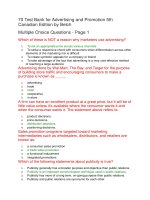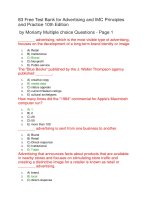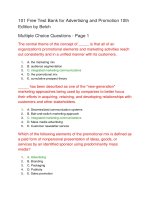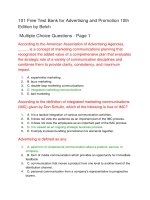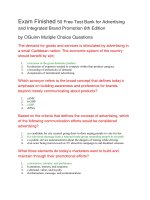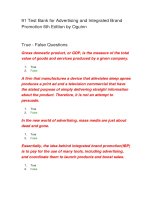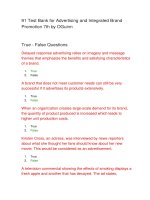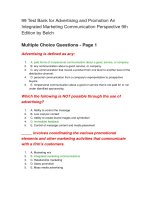91 test bank for advertising and integrated brand promotion 7th by OGuinn
Bạn đang xem bản rút gọn của tài liệu. Xem và tải ngay bản đầy đủ của tài liệu tại đây (122.75 KB, 24 trang )
91 Test Bank for Advertising and Integrated Brand
Promotion 7th by OGuinn
True - False Questions
Delayed response advertising relies on imagery and message
themes that emphasize the benefits and satisfying characteristics
of a brand.
1.
True
2.
False
A brand that does not meet customer needs can still be very
successful if it advertises its products extensively.
1.
True
2.
False
When an organization creates large-scale demand for its brand,
the quantity of product produced is increased which leads to
higher unit production costs.
1.
True
2.
False
Kristen Cross, an actress, was interviewed by news reporters
about what she thought her fans should know about her new
movie. This would be considered as an advertisement.
1.
True
2.
False
A television commercial showing the effects of smoking displays a
fresh apple and another that has decayed. The ad states,
"Smoking kills." The commercial was paid for by a medical
company. This is an example of a public service announcement.
1.
True
2.
False
In the new world of advertising, mass media is nonexistent.
1.
True
2.
False
Advertising is only one area of the marketing mix, and it
represents only one of the many different integrated brand
promotion tools used in the marketing mix.
1.
True
2.
False
The marketing process is designed to generate revenue for the
firm.
1.
True
2.
False
Consumers’ perceptions can be based on tangible differences or
on image and style factors.
1.
True
2.
False
Integrated brand promotion (IBP) tools include various types of
advertising, but does not include traditional advertising forms.
1.
True
2.
False
Social meaning refers to what a product or service means in a
societal context.
1.
True
2.
False
An advertisement refers to a specific message that an
organization has created to persuade an audience.
1.
True
2.
False
Government officials are the most conspicuous audience
category in that most mass media advertising is directed at them.
1.
True
2.
False
A brand variant is created when a company adapts and expands
its current brand into a new product area.
1.
True
2.
False
The organization that pays for an advertisement is referred to as
the client.
1.
True
2.
False
A latenight television commercial for kitchen appliances urges
viewers to respond to the ad. It states, “Call this tollfree number in
the next 30 minutes to receive a free cutting board” and assures
them that “Operators are on duty.” This is an example of direct
response advertising.
1.
True
2.
False
A firm that manufactures a device that alleviates sleep apnea,
produces a television commercial that delivers facts about the
product. Therefore, the objective of the ad is not to persuade the
customer because the ad is purely informational.
1.
True
2.
False
Integrated marketing communication lays emphasis on
communication, and not on the brand.
1.
True
2.
False
Brand equity occurs over a short period of time.
1.
True
2.
False
The essential task for advertising is to develop a message that is
different and unmistakably linked to a company’s brand.
1.
True
2.
False
To survive in today’s marketplace, contemporary businesses and
organizations are strongly focusing on one single concept—
communication.
1.
True
2.
False
When a brand is perceived by consumers as one in which the
value of products is lower than its costs, the brand is said to have
brand equity.
1.
True
2.
False
Harry's World is a department store that operates in three
different states in the country of Rhodia. Harry's World advertises
its stores only in these three states. This is an example of
regional advertising.
1.
True
2.
False
Symbolic value differs from social meaning in that social meaning
refers to what a product or services means to an organization in a
non-literal way.
1.
True
2.
False
A producer of educational materials wants to deliver an
advertising message to an audience of teachers and principals. In
this scenario, personal selling would be the best option because
this tool is appropriate for large groups of people.
1.
True
2.
False
A target audience is a particular group of consumers singled out
by an organization for an advertising or IBP campaign.
1.
True
2.
False
Primary demand stimulation is likely to have an impact only on
those products that have been in the market for a long time.
1.
True
2.
False
Blitz, a popular kitchen appliances manufacturer, launches its
new line of blenders. To promote its product, it uses the same
billboard ads across different countries around the world. This is
an example of international advertising.
1.
True
2.
False
Gross domestic product is the measure of the total value of goods
and services produced by an organization.
1.
True
2.
False
Advertising is related to the gross domestic product in that it can
contribute to levels of overall consumer demand when it helps
introduce new products.
1.
True
2.
False
The marketing mix involves four areas of responsibility—
conceiving, pricing, promoting, and distributing—involved in the
promotion of goods, services, or ideas.
1.
True
2.
False
Orange Inc., a cell phone manufacturer, has launched promotions
of its new product in local newspapers, billboards, and the
company's website, and has distributed flyers in local universities.
This is an example of an integrated brand promotion.
1.
True
2.
False
Mass-mediated communication has three major components:
production, accommodation, and distribution.
1.
True
2.
False
Cuddles, a baby's retail clothing brand, uses the softest cotton
wool that enables its products to stand out from those of its
competitors. Cuddles has used external positioning to stand out
over its competitors.
1.
True
2.
False
Consumer preferences and new technologies are reshaping the
communication environment.
1.
True
2.
False
Multiple Choice Questions
When national companies and local merchants share advertising
expenses, they are taking part in .
1.
a. brand extension
2.
b. international advertising
3.
c. cooperative advertising
4.
d. trade channeling
Which of the following slogans is an example of corporate
advertising?
1.
a. “OhhSooGood" by Yummy's, a biscuit company
2.
b. “The quick fix stick" by Quicks, a glue manufacturer
3.
c. "Fizzy! Bubble! Guzzle!" by Fizzy Pop, a soft drink company
4.
d. “Think creatively" by Helix phones
CarlBerrys, a department store, has launched a series of
advertisements inviting people to do their holiday shopping at
their store. This is an example of .
1.
a. institutional advertising
2.
b. delayed response advertising
3.
c. corporate advertising
4.
d. advocacy advertising
Nature Fresh, a local grocery store chain, has decided to run a
series of advertisements. For this to be considered as an
advertising campaign, Nature Fresh's ads must:
1.
a. focus on store products rather than store services.
2.
b. target a mass audience.
3.
c. appear in print media.
4.
d. be unpaid communication.
KidsCause, a metropolitan outreach organization that collects and
donates toys for needy children, buys airtime on WXXY (a local
TV station) to promote its annual toy collection. Amazing Ads, a
local ad agency, shoots the video and produces a 30-second
commercial and Downtown Deli donates sandwiches for
volunteers on the days that KidsCause collects, wraps, and
distributes toys. In this promotional effort, who is the client?
1.
a. Amazing Ads
2.
b. Downtown Deli
3.
c. WXXY
4.
d. KidsCause
Public service announcements (PSAs):
1.
a. are a type of advertising that are run by nonprofit organizations.
2.
b. are commercial they way that ads are.
3.
c. attempt only persuade and not to inform.
4.
d. are not paid for like an ad.
"Make love, not war" stated at the end of a radio station broadcast
is an example of:
1.
a. a mobile advertisement.
2.
b. influencer marketing.
3.
c. personal selling.
4.
d. a public service announcement.
Radical, a men's deodorant brand, displays its product in
advertisements as being worn by men who are attractive and
popular. This is an example of .
1.
a. symbolic value
2.
b. direct response advertising
3.
c. selective demand stimulation
4.
d. internal positioning
Based on the criteria that defines advertising, which of the
following examples would be considered as advertising?
1.
a. A candidate for city council going door-to-door urging people to vote for
her
2.
b. A car manufacturer stating the efficiency of its product to motivate
customers to make a purchase
3.
c. A public service announcement about the dangers of talking on the
phone while driving
4.
d. An actor being interviewed on television about his campaign to aid
people with physical disabilities
Which of the following is true of integrated brand promotion
(IBP)?
1.
a. It is a simple process.
2.
b. It uses promotional tools that do not need to be evaluated.
3.
c. It prevents the exposure of a brand.
4.
d. It allow marketers to reach target customers in different ways.
If Caltec Corp., a computer manufacturer, increased the number
of computers produced to twice the amount it used to, the
economies of scale would:
1.
a. lower the fixed cost per unit.
2.
b. increase the fixed cost per unit.
3.
c. increase the variable costs.
4.
d. lower the defect rate of products.
Samsonic is the leading manufacturer of televisions in the world.
It has created a new advertisement that it wants to be aired all
over the world, changing only the language for each country. This
is an example of:
1.
a. national advertising.
2.
b. international advertising.
3.
c. regional advertising.
4.
d. global advertising.
Which of the following is one of the four areas of responsibility in
the marketing mix?
1.
a. Price
2.
b. Communication
3.
c. Convenience
4.
d. Process
Which of the following is an example of international advertising?
1.
a. Crispy Cracks promoting their new line of cracker at the Olympics
2.
b. Flextronic advertising its flat-screen TVs in different states of a country
3.
4.
c. Radicle creating different versions of its new detergent ad for various
countries
d. Unicorn featuring its “unicorn” logo on gear worn by tennis players
The mixing of various promotional tools is known as .
1.
a. integrated marketing communications
2.
b. a marketing mix
3.
c. cooperative advertising
4.
d. market segmentation
Rachel, the mayor of Genovia, had recently appeared on a local
news telecast. She stated that she should be re- elected because
she contributed to the increased rate of employment in the
metropolitan area. In order for her message to be considered as
an advertisement, which of the following conditions should be
met?
1.
a. The message must be noncommercial.
2.
b. There must be a public service announcement included.
3.
c. The airtime must be paid for.
4.
d. The message must involve the promotion of a product.
CoolNature, a manufacturer of mineral water, has recently
launched its product in the market. It starts a rigorous advertising
campaign to highlight the benefits of its product. This is an
example of .
1.
a. selective demand stimulation
2.
b. economies of scale
3.
c. market segmentation
4.
d. primary demand stimulation
Market segmentation is the process of:
1.
a. creating advertising strategies to reach out to a wide consumer base.
2.
b. creating a new product line that is relatively different from the firm's
existing product line.
3.
c. breaking down a large widely varied market into more similar submarkets.
4.
d. identifying competitors in the market that could be possible threats to the
success of the company.
Firms have not fully exploited all the opportunities that
smartphones or iPads.
1.
a. broadcast media
2.
b. mobile marketing
3.
c. personal selling
4.
d. print media
Effective internal positioning is accomplished by:
1.
a. distributing products to a market that is wider than those of one's
competitors.
2.
b. using advertising to compare a product's distinctions from those of one's
rival firms.
3.
c. developing brand features and values that are distinctive from the
competition.
4.
d. developing vastly different products within the firm's product line.
Which of the following is true regarding advertising?
1.
a. Advertising is a external to the social interaction process.
2.
b. Advertising is solely responsible for the increase of product sales.
3.
c. Advertising plays a pivotal role in world commerce.
4.
d. Advertising is a simple communication process.
attempts to develop brand awareness and preference over time,
as well as emphasize the benefits of using that brand.
1.
a. Delayed response advertising
2.
b. Co-op advertising
3.
c. Direct response advertising
4.
d. Sales promotion
Cryptic Inc., a literary publisher, has established offices in more
than 20 states in Lentasia. Additionally, it has advertised in all
states of the country. This is an example of advertising.
1.
a. local
2.
b. national
3.
c. regional
4.
d. global
The purchase of certain products, such as cars, shoes, and
sunglasses, signify class membership. This indicates that these
brands have .
1.
a. economies of scale
2.
b. social meaning
3.
c. internal positioning
4.
d. low brand equity
Integrated brand promotion (IBP) can be defined as:
1.
a. the collaboration of two or more brands within a single advertisement
with the intent of sharing costs.
2.
b. the coordination of a number of promotional tools to create widespread
brand exposure.
3.
c. a company's decision to focus on a wide range of traditional advertising
forms to replace nontraditional forms.
4.
d. a unique concept seen mainly in local advertising campaigns.
The promotional tool used most often to communicate with
members of a trade channel is personal selling. Which of the
following is a reason behind this?
1.
a. Personal selling is the most inexpensive form of communication.
2.
b. Members of trade channels are the most conspicuous audience.
3.
c. Members of trade channels are the target audience for producers of only
household products.
4.
d. The target audience represents a relatively small, easily identifiable
group.
YouStock, an online broker, pays for a 60-second television
commercial to be telecast during the Football World Cup. The
commercial promotes the reliability of YouStock’s advice,
expertise, and personal attention in assisting online customers
with stock portfolio creation and management. The spot created
by YouStock is:
1.
a. a public service announcement.
2.
b. a point-of-purchase advertisement.
3.
c. representative of personal selling.
4.
d. an advertisement promoting a service.
The customers of TimeZone watches have high brand loyalty and
although the watches are priced at high rates, TimeZone's
customers are willing to pay the market price of the product. This
is an example of .
1.
a. low brand equity
2.
b. market segmentation
3.
c. economies of scale
4.
d. inelasticity of demand
Which of the following is true of inelasticity of demand?
1.
a. The supply of the product is greater than its demand.
2.
b. Consumers are less sensitive to price increases.
3.
c. Customers have low brand loyalty.
4.
d. It leads firms to decrease profit margins.
Brad and his wife, Carla are watching a commercial that they’ve
never seen before. Brad thinks that the ad is humorous. However,
Carla finds the ad monotonous and uninteresting. This example
illustrates that:
1.
a. ads are interpreted differently based on a person's experiences and
beliefs.
2.
b. what a message means to any given consumer is a function an isolated
solitary thinker.
3.
c. the ad is communicated effectively to its target audience.
4.
d. the ad contains the same meaning for all audience members.
A brand of soup is perceived by consumers as a “good deal,” one
that provides a certain level of comfort and satisfaction that goes
well beyond the money it takes to purchase a few cans. In this
example, the soup is considered to have:
1.
a. low brand loyalty.
2.
b. elasticity of demand.
3.
c. economies of scale.
4.
d. value.
A particular group of consumers that is singled out by an
organization for its advertising or integrated brand promotion
campaign is called:
1.
a. a target audience.
2.
b. cooperative advertising.
3.
c. a focus group
4.
d. a sponsorship.
Which of the following is an essential criteria for communication to
be considered as an advertisement?
1.
a. The communication must be noncommercial.
2.
b. It must be a mass-mediated attempt to persuade.
3.
c. The message conveyed must be short.
4.
d. It must involve face-to-face communication.
Which of the following is considered as a member of a trade
channel?
1.
a. Wholesalers
2.
b. Household consumers
3.
c. Government employees
4.
d. Philanthropic groups
Sparkles Inc. has launched an advertisement on a local television
channel. The ad promotes the new set of Acrylic paints and
informs customers that the first five people who call in the next
two days would receive a free sample. This is an example of .
1.
a. direct response advertising
2.
b. personal selling
3.
c. delayed response advertising
4.
d. internal positioning
RomTech, a cell phone manufacturer, displays in its
advertisement that its products are better than others in the
market because they are waterproof and scratch proof. This is an
example of .
1.
a. selective demand stimulation
2.
b. economies of scale
3.
c. inelasticity of demand
4.
d. direct response advertising
Which of the following is a difference between IBP and IMC?
1.
2.
3.
a. IBP ignores the importance of communication whereas IMC does not.
b. IBP focuses more on the need for coordinated and synergistic
messages.
c. IMC emphasizes the brand, whereas IBP does not.
4.
d. IBP goes beyond the parameters of IMC.
is the measure of the total value of goods and services produced
within an economic system.
1.
a. Gross domestic product
2.
b. Residual income
3.
c. Net present value
4.
d. Gross domestic income
The two major components of the mass-mediated communication
model are:
1.
a. primary demand and selective demand.
2.
b. advertiser and consumer.
3.
c. internal position and external position.
4.
d. production and reception.
is the process of creating a perceived distinction between an
organization's brand and a competitor's brand.
1.
a. Market analysis
2.
b. Co-op advertising
3.
c. Market segmentation
4.
d. Differentiation
Which of the following would be considered as a trade journal?
1.
a. A publication written for health professionals
2.
b. An e-zine for emerging writers to publish their work
3.
c. A magazine for fitness enthusiasts
4.
d. A newspaper carrying news articles about a particular city
In the model of mass-mediated communication, the:
1.
a. producers of the message control the reception of the content.
2.
b. producers of the message control the interpretation of the content.
3.
c. consumers interpret ads in a way that makes sense to them individually
and serves their needs.
4.
d. receiver's interpretations are invariably compatible with what the
producer intended to convey.
is a type of advertising that communicates the specific features,
values, and benefits of a product offered by a particular
company.
1.
a. Advocacy advertising
2.
b. Corporate advertising
3.
c. Brand advertising
4.
d. Institutional advertising
WoodChuck Inc., a furniture retailer, establishes itself in the
North-east state of Largonia and has spread to many other states
within the country. It has conducted promotional activities in all of
these states to create awareness among the public about its
products. This is an example of advertising.
1.
a. global
2.
b. local
3.
c. cooperative
4.
d. regional
Members of trade channels include:
1.
a. not-for-profit businesses.
2.
b. retailers.
3.
c. household consumers.
4.
d. government officials.
The advertising aimed at government officials and employees is
dominated by:
1.
a. local and regional television commercials.
2.
b. point-of-purchase advertising and influencer marketing.
3.
c. direct mails, catalogs, personal selling, and Web ads.
4.
d. event sponsorships.
A family-owned meat shop has expanded to four locations within
the Preston area and suburbs, running regular promotions in the
daily editions of The Preston City Star newspaper. These
newspaper ads are forms of advertising.
1.
a. local
2.
b. trade
3.
c. regional
4.
d. national
HireUp Inc., a recruitment agency, has launched a series of
advertisements about its capabilities in effectively managing firms’
labor forces. Which of the following audience categories is HireUp
most likely targeting?
1.
a. Household members
2.
b. Members of business organizations
3.
c. Professionals
4.
d. Government employees
During the National Basketball Championship, a national sports
equipment manufacturer runs an edgy, fast-paced commercial
featuring a well-known hip hop artist. A group of university
students watching the ad in a fraternity house interprets the
commercial in roughly the same way. Which of the following is a
reason why audience members share a similar interpretation of
the ad?
1.
a. The backgrounds and value systems of audience members are similar.
2.
b. The interpretation of an ad is a function of an isolated solitary thinker.
3.
c. Ads contain a single meaning for all members of a target audience.
4.
d. Communication is inherently an individual process and not a social
process.
Which of the following is a similarity between the market
strategies, positioning and differentiation?
1.
a. Both involve standardizing and regularizing products.
2.
b. Both depend on a perceived image of tangible or intangible features.
3.
4.
c. Both involve marketing products in a way that make them seem similar to
competitors' products.
d. Both involve targeting a small market segment.
In today's world, what three elements do marketers want to build
and maintain through their promotional and advertising efforts?
1.
a. Awareness, identity, and preference
2.
b. Attention, curiosity, and response
3.
c. Demand, value, and interaction
4.
d. Information, message, and communication
Which of the following is an example of a brand extension?
1.
a. Tracker, a company selling security systems, advertises its product on a
local television network.
2.
b. Dog Handler, a manufacturer of leashes for dogs, collaborates with a
competitor to expand its market base.
3.
c. Blossoms, a women’s perfume line, advertises its new line through sales
promotions and pointofpurchase advertising at department stores.
4.
d. The manufacturers of Cocoa flakes, a popular cereal, launches a biscuit
called "Cocoa crunch" in a new product category.
Free Text Questions
What is integrated marketing communication (IMC)? Discuss the
differences between integrated marketing communication and
integrated brand promotion (IBP).
Answer Given
Beginning in about 1990, the concept of mixing various promotional tools was
referred to as integrated marketing communications (IMC). However, the reality of
promotional strategies in the 21st century demands that the emphasis on
communication give way to an emphasis on the brand. IMC emphasizes the
communication effort per se and the need for coordinated and synergistic
messages. IBP retains the emphasis on coordination and synergy of
communication but goes beyond the parameters of IMC. In IBP, the emphasis is
on the brand and not just communication. With a focus on building brand
awareness, identity, and ultimately preference, the IBP perspective recognizes
that coordinated promotional messages need to have brand-building effects in
addition to the communication effects.
Define marketing. Describe the marketing mix and the role of
advertising in it.
Answer Given
Marketing is the process of planning and executing the conception, pricing,
promotion, and distribution of ideas, goods, and services to create exchanges that
satisfy individual and organizational objectives. These four areas of responsibility
and decision making in marketing are referred to as the "marketing mix." The word
mix is used to describe the blend of strategic emphasis on the product versus its
price versus its promotion (including advertising) versus its distribution when a
brand is marketed to consumers. This blend, or mix, results in the overall
marketing program for a brand. Advertising is important, but it is only one of the
major areas of marketing responsibility and it is only one of many different IBP
tools relied on in the marketing mix.
A brand is greatly shaped and impacted by advertising. List five
ways in which advertising influences brand management and
explain each of them briefly.
Answer Given
Advertising can affect a brand in five broad ways: By informing and persuading:
Target audiences can learn about a brand’s features and benefits through
advertising. No other variable in the marketing mix is designed to accomplish this
communication. By introducing new brands or brand extensions: Advertising is
absolutely critical when organizations introduce a new brand or extensions of
existing brands to the market.When brand extensions are brought to market,
advertising and IBP play a key role in attracting attention to the brand—so much
so that researchers now suggest that “managers should favor the brand extension
with a greater allocation of the ad budget. This is often accomplished with
advertising working in conjunction with other promotional activities such as sales
promotions and point-of purchase displays. By building and maintaining loyalty
among consumers: Loyalty to a brand is one of the most important assets a firm
can have. Brand loyalty occurs when a consumer repeatedly purchases the same
brand to the exclusion of competitors’ brands. Even though brand features are the
most important influence on building and maintaining brand loyalty, advertising
plays a key role in the process as well. Advertising reminds consumers of those
brand features—tangible and intangible. By creating an image and meaning for a
brand: Advertising can communicate how a brand fulfills needs and desires and
therefore plays an important role in attracting customers to brands that appear to
be useful and satisfying. It can also help link a brand’s image and meaning to a
consumer’s social environment and to the larger culture, and in this way,
advertising can actually deliver a sense of personal connection for the consumer.
By building and maintaining brand loyalty within the trade: Wholesalers, retailers,
distributors, and brokers can favor one brand over others given the proper support
from a manufacturer. Advertising and particularly advertising integrated with other
brand promotions is an area where support can be given.
Briefly explain the concepts of market segmentation,
differentiation, and positioning.
Answer Given
Advertising helps a firm implement the important market strategies of market
segmentation, differentiation, and positioning. Market segmentation is the process
of breaking down a large and widely varied market (a heterogeneous market) into
many smaller sub-markets or segments (homogeneous markets) based on certain
consumer characteristics. Underlying the strategy of market segmentation are the
facts that consumers differ in their wants and that the wants of one person can
differ under various circumstances. Differentiation is the process of creating a
perceived difference, in the mind of the consumer, between a brand and its
competition.The perceived differences can be tangible differences, or they may be
based on image or style factors. The critical issue in differentiation is that
consumers perceive a difference between brands. Positioning is the process of
designing a brand so that it can occupy a distinct and valued place in the target
consumer’s mind relative to other brands. This distinctiveness can be
communicated through advertising. The importance of positioning can be
understood by recognizing that consumers create a perceptual space in their
minds for all the brands they might consider purchasing. A perceptual space is
how one brand is seen on any number of dimensions—such as quality, taste,
price, or social display value—in relation to those same dimensions in other
brands.
